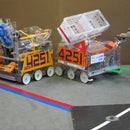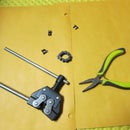Introduction: Game Analysis
We are Cougar Robotics 4251 and this is for the Instructables Sponsorship Program.
With kickoff rapidly approaching, I figured it was appropriate
With kickoff rapidly approaching, I figured it was appropriate
Step 1: Points! Points! Points!
Points are probably the single most important thing in an FTC game. There are 2 main things we think about when we are developing a strategy. To win a match you can either score a bunch of points and outscore your opponents or you can score a few points and keep your opponents from scoring at all. We like to go with the first option. We don't like to have a strategy based on being able to completely shut down the scoring of the opposing alliance. We have found it to be unreliable. Below, I have listed the questions we ask ourselves when looking at the game.
Where are the points?
What are the limits?
Are there unlimited points opportunities?
- Like lifting in Bowled Over!
Where are the points?
What are the limits?
Are there unlimited points opportunities?
- Like lifting in Bowled Over!
Step 2: Time
Throughout the season and during a match, time is your most valuable resource.
How long will things take?
- How long does it take to lift a partner in Ring It Up!
Are there low/no value goals that will simply waste time?
- Sorting for magnetic balls in Bowled Over!
How long will things take?
- How long does it take to lift a partner in Ring It Up!
Are there low/no value goals that will simply waste time?
- Sorting for magnetic balls in Bowled Over!
Step 3: Other Robots
It is important to remember that you will not be the only robot on the field. During practice, you might be, but it is always important to think about how other robots will affect your strategy.
How easy will defense be?
- Rack was easy to defend in Ring It Up!
How many robots does it take to accomplish a given task?
- Lifting in Ring It Up!
How easy will defense be?
- Rack was easy to defend in Ring It Up!
How many robots does it take to accomplish a given task?
- Lifting in Ring It Up!
Step 4: Your Robot
Now that you have thought about everything else, you can start thinking about your own robot and its desired capabilities.
What qualities should a robot have, let’s take drivetrain for example
- Ring It Up! - powerful, hold/take a position in front of rack
Scoring opportunities space constrained
- Bowled Over - agility, speed more important than power
Scoring opportunities all over the field
- Get Over It! - drive train that could navigate all the terrain.
What qualities should a robot have, let’s take drivetrain for example
- Ring It Up! - powerful, hold/take a position in front of rack
Scoring opportunities space constrained
- Bowled Over - agility, speed more important than power
Scoring opportunities all over the field
- Get Over It! - drive train that could navigate all the terrain.
Step 5: Evolving Strategy
Another important thing is to remember that the game will evolve and adapt over time. You must do likewise. As the first early tournaments are played, you will see what begins to work and doesn't. It became apparent pretty quickly in the Ring It Up! season that lifting your partner was not worth it. It took both robots on your alliance out of scoring. Two fast ring scoring robots could outscore that lifting bonus easily.
This becomes a secondary job of the scouting team. As they watch matches and record information, your scouts will begin to see the best way the game can be played. After tournaments, our team discusses how our strategy needs to evolve to stay competitive.
Every year, when our team first sees the game, we ask ourselves these questions and any other that jump to mind at the time. With this, we have usually been able to choose a good strategy from the beginning.
This becomes a secondary job of the scouting team. As they watch matches and record information, your scouts will begin to see the best way the game can be played. After tournaments, our team discusses how our strategy needs to evolve to stay competitive.
Every year, when our team first sees the game, we ask ourselves these questions and any other that jump to mind at the time. With this, we have usually been able to choose a good strategy from the beginning.




